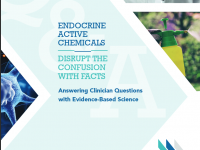
Human-relevant potency threshold (HRPT) for ERα agonism

Endocrine Active Chemicals: Disrupt the Confusion with Facts

A Review of the Evidence for Endocrine Disrupting Effects of Current-Use Chemicals on Wildlife Populations

EDC Lists Often Hazardous Unto Themselves

An Appeal for the Integrity of Science and Public Policy

A Comprehensive Review of Regulatory Test Methods for Endocrine Adverse Health Effects

There is no Evidence that Endocrine-Disrupting Chemicals Affect our Health by Agnes Wold

Regulatory Predictability Needed for an Industry Committed to Innovation by Howard Minigh

But, Who’s Really Manipulating the Science on Endocrine-Disrupting Chemicals? by Gregory Bond

Endocrine Disruption: Where Have we Been, Interpretation of Data, and Lessons Learned from Tier 1